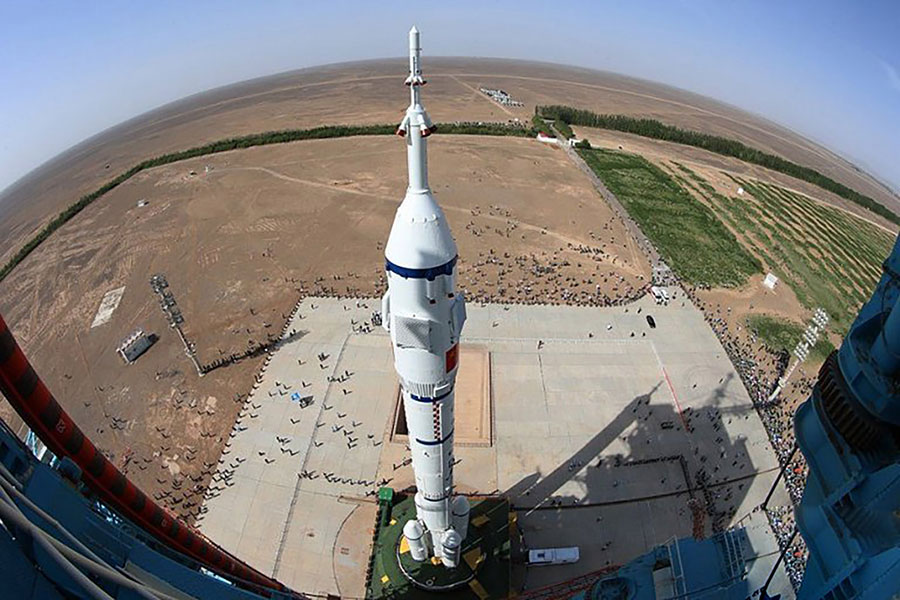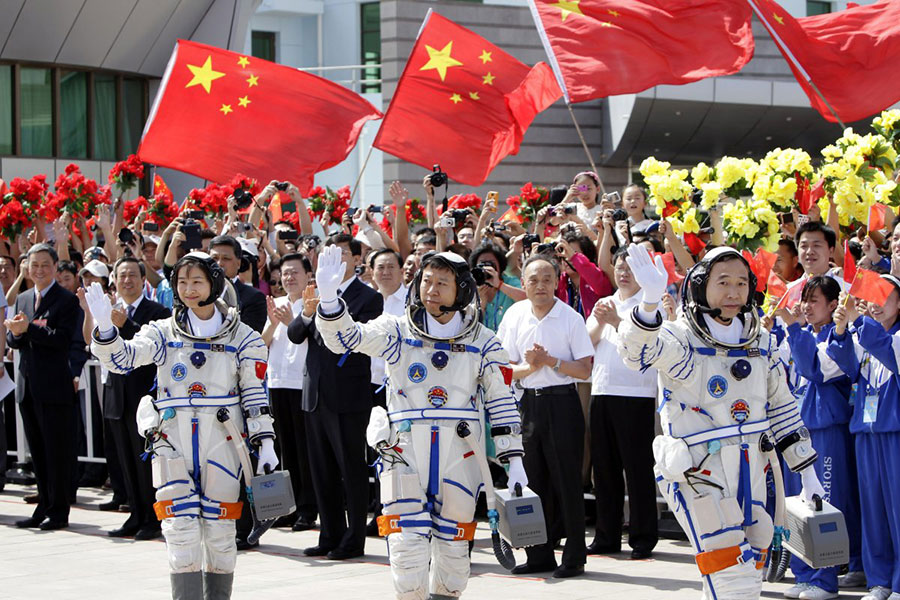China will launch a manned space mission Monday to send two astronauts to China’s orbiting space lab Tiangong-2. The trip will last two days, and the crew will stay for 30 days to make research in different fields, including atomic space clocks. The launch of the Shenzhou-11 spacecraft is another proof that China is trying to catch up with the U.S. in the space race.
The Shenzhou-11 will leave Earth at 07:30 a.m. local time (23:30 GMT) from the Jiuquan Satellite Launch Center in the Gobi desert, an isolated military launching pad in Inner Mongolia. Scientists from around the world will witness China’s effort to be at the cutting edge of the space race happening between the United States, Russia, and now the Asian giant.

Jing Haipeng and Chen Dong will travel to China’s space lab Tiangong-2 -launched September 15 and also known as “Heavenly Palace 2”- to begin the country’s sixth and longest manned mission. Jing is 49 years old and has been into space twice, and, because of his experience, he will be commanding the mission. Chen Dong is 37 years old, and he is a junior astronaut.
Tiangong 2 was launched after the first Tiangong lab was decommissioned earlier this year after docking three rockets.
According to Chen, their mission is characterized by its duration and its schedule to do more experiments. The mission will test the lab’s capability to host life, and it also has planned to carry several research projects related to in-orbit equipment repairs, space physics, and biology, atomic space clocks, solar storms research and aerospace medicine.
In a televised conference, Chen said they would focus on improving their ability to handle emergencies in orbit, medical first aid and rescue capabilities.
The spacecraft’s name -that will take both Jing Haipeng and Chen Dong- translates as “Divine Vessel” and it will carry more than the two astronauts and the equipment they need. The Shenzhou 11 mission also takes experiments made by Chinese middle school students. Their projects were selected in a science competition and include an investigation that will take silk worms into space.
China’s recent mission are focusing on near-Earth space exploration, but future missions include trips farther than 400 km (249 miles), stated Zhang Yulin from the Central Military Commission and the Chinese space program.
Monday’s mission and previous ones are considered first attempts to possible crewed missions to the dark side of the Moon and the Red Planet, which has America alarmed.
China could be leading the space race in the next decade
President Xi Jinping has encouraged his country to become a space power, but Jinping’s call has seen as a threat by the United States. The Asian giant made clear that their space program is for peaceful purposes, but the U.S. Defense Department insists that China’s increasing capabilities are aiming to prevent other nations to use space-based assets during a crisis.
Suspicions about China’s intentions have been around since 2015 and even before. American officials said in a congressional report in March 2015 that the Asian giant intends to become “militarily, diplomatically, commercially, and economically as competitive as the U.S. is in space.”
Beijing is investing significant amounts of money to fulfill their ambitions as a country, which included being the first nation to explore the dark side of the moon and sending a probe to Mars in 2020. China was the second-largest spender in space with a budget of $13 billion in 2013. The first spender is the U.S. with a $40 billion budget, according to estimates by the Organization for Economic Cooperation and Development.
Leroy Chiao, a former NASA astronaut, and veteran of four space flights warned that China recent efforts into space could leave the U.S. behind in the race. In Chiao’s view, China is building its capability to lead space exploration.
It seems that the comments of the former astronauts are exaggerating China’s real power in space since the nation is far behind America’s accomplishments in space. But it is clear that China is indeed trying to catch up with the U.S. when it comes to space goals.
Last year only, China carried out 19 successful space launches, leaving behind the United States with 18 launches, although the 2015 record is for Russia, with 26 successful launches. Still, China could be reaching the 2016 record with 20 launches.

China’s achievements in space are taken seriously by Representatives and U.S. officials
Rep. Lamar Smith from the House committee on science, space, and technology said on September 27 that the U.S. needs to “reassert its leadership” in space.
“Over the years, our focus has waned and now China’s accomplishments in space have become commonplace. We cannot afford to ignore Chinese achievements and become complacent,” Smith added.
To worsen America’s concern, China is not only getting ahead in the space race but in technology and science. Last month, China completed the world’s biggest $180-million radio telescope. The telescope size is equivalent to 30 soccer fields and can receive signals from 13.7 million light years away. The achievement makes China the country with more chances to receive communication from extraterrestrial civilizations.
When it comes to technology, China is leading the supercomputer market. The country has built the world’s fastest supercomputers that can process massive data: The Sunway TaihuLight. Its processor runs 93 petaflops, which means that it can run a million billion floating-point operations per second of sustained performance.
China is seeking cooperation with the U.S. and other U.N. country members space programs. The Asian country signed an agreement with the United Nations last June offering its space station to other countries to experiment and share findings.
But America is not participating in that agreement. A U.S. law passed in 2011 bans NASA from cooperating with China’s space program to military security concerns.
Apparently, America’s suspicious behavior could cost the country international cooperation and the opportunity to accelerate the 2030 Mars mission.
Source: NBC News
